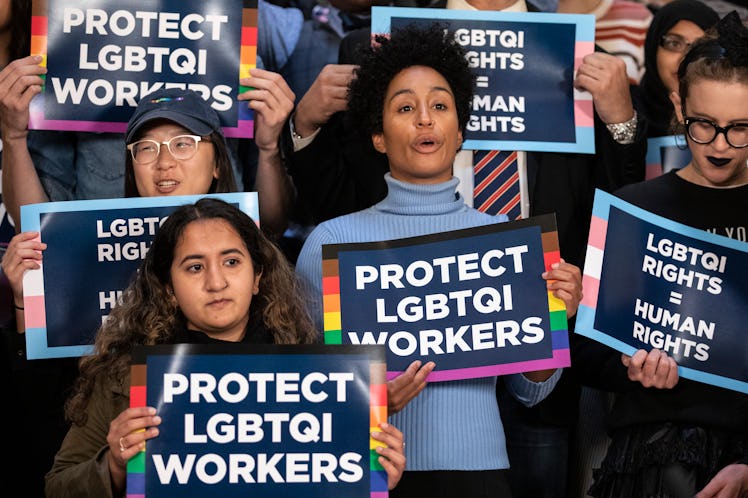
Twitter Is Rising Up About The Supreme Court's LGBTQ Rights Cases
LGBTQ rights took center-stage at the Supreme Court on Oct. 8, the country's highest court heard oral arguments in three key cases that could significantly impact LGBTQ workers across the country. In light of this, activists and lawmakers have expressed their solidarity with the employees in each case, and these tweets about the Supreme Court's LGBTQ rights cases call on Americans to rise up and demand justice.
The Supreme Court is currently handling three cases concerning the rights and protections of LGBTQ workers. At question in all three cases is whether the definition of "sex," under anti-discrimination statute Title VII of the Civil Rights Act of 1964, includes sexual orientation and gender identity. Both Altitude Express Inc. v. Zarda and Bostock v. Clayton County address two lawsuits filed by Donald Zarda and Gerald Bostock — gay men who allege they were fired from their jobs as a result of their sexual orientations. Zarda died in an extreme sports accident in 2014, but his sister and partner have been arguing his case following his death. Harris Funeral Homes Inc. v. EEOC, meanwhile, concerns a trans woman named Aimee Stephens. According to Jezebel, Stephens was fired from her job after her employer learned she was transgender. No federal law currently protects LGBTQ Americans from discrimination on the basis of gender identity or sexual orientation, Vox reported. So, the court's decision in each of these three cases could set an important precedent for LGBTQ rights.
If the Supreme Court rules in favor of the LGBTQ workers at the center of these cases, it could define sexual orientation and gender identity as a protected class, and protect LGBTQ people from discrimination in the workplace. On the flip side, if the court rules in favor of the employers in each case, the discrimination LGBTQ people may face at work could grow even worse. That's why activists, lawmakers, and LGBTQ workers are tweeting out their solidarity, many of them under the hashtag #RiseUpOct8.
According to The New York Times, Tuesday, Oct. 8 marked the first time since Justice Anthony Kennedy's retirement in July 2018 that the Supreme Court heard cases concerning LGBTQ rights. When Kennedy was still on the bench, he joined the Supreme Court's four liberal justices in making marriage equality the law of the land in 2015, and routinely aligned with the court's liberal wing on other LGBTQ rights cases. But since Kennedy's departure — and the appointment of more conservative justices like Neil Gorsuch and Brett Kavanaugh — LGBTQ Americans have been rightly concerned about how the court would handle their cases. So on Tuesday, as the court heard oral arguments in each of the three cases, LGBTQ activists and allies gathered outside the Supreme Court to demand justice.
“I hope — no matter what our justices decide — that Americans know that it should not be OK to discriminate against someone simply for being who they are,” trans actress and activist Laverne Cox said outside the Supreme Court, per Reuters.
As the above tweets make clear, LGBTQ Americans and their allies are committed to fighting for LGBTQ rights and protection from discrimination under the law. No matter how the Supreme Court rules on the three cases it heard on Tuesday, activists and advocates will continue fighting for discrimination-free workplaces. A ruling on the cases is expected in June of 2020.